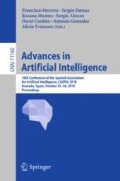Abstract
Recurrent neural networks have demonstrated to be good at tackling prediction problems, however due to their high sensitivity to hyper-parameter configuration, finding an appropriate network is a tough task. Automatic hyper-parameter optimization methods have emerged to find the most suitable configuration to a given problem, but these methods are not generally adopted because of their high computational cost. Therefore, in this study we extend the MAE random sampling, a low-cost method to compare single-hidden layer architectures, to multiple-hidden-layer ones. We validate empirically our proposal and show that it is possible to predict and compare the expected performance of an hyper-parameter configuration in a low-cost way.
Access this chapter
Tax calculation will be finalised at checkout
Purchases are for personal use only
Notes
- 1.
Code available at https://github.com/acamero/dlopt.
References
Abadi, M., et al.: Tensorflow: a system for large-scale machine learning. In: OSDI, vol. 16, pp. 265–283 (2016)
Albelwi, S., Mahmood, A.: A framework for designing the architectures of deep convolutional neural networks. Entropy 19(6), 242 (2017)
Bengio, Y., Simard, P., Frasconi, P.: Learning long-term dependencies with gradient descent is difficult. IEEE Trans. Neural Netw. 5(2), 157–166 (1994)
Bergstra, J.S., Bardenet, R., Bengio, Y., Kégl, B.: Algorithms for hyper-parameter optimization. In: Shawe-Taylor, J., Zemel, R.S., Bartlett, P.L., Pereira, F., Weinberger, K.Q. (eds.) Advances in Neural Information Processing Systems 24, pp. 2546–2554. Curran Associates, Inc. (2011)
Bracewell, R.N., Bracewell, R.N.: The Fourier Transform and Its Applications, vol. 31999. McGraw-Hill, New York (1986)
Camero, A., Toutouh, J., Stolfi, D.H., Alba, E.: Evolutionary deep learning for car park occupancy prediction in smart cities. In: Kotsireas, I., Pardalos, P. (eds.) Learning and Intelligent OptimizatioN (LION) 12, pp. 1–15. Springer, Heidelberg (2018)
Camero, A., Toutouh, J., Alba, E.: DLOPT: deep learning optimization library. arXiv preprint arXiv:1807.03523, July 2018
Camero, A., Toutouh, J., Alba, E.: Low-cost recurrent neural network expected performance evaluation. arXiv preprint arXiv:1805.07159, May 2018
Domhan, T., Springenberg, J.T., Hutter, F.: Speeding up automatic hyperparameter optimization of deep neural networks by extrapolation of learning curves. In: Proceedings of the 24th International Conference on Artificial Intelligence, IJCAI 2015, pp. 3460–3468. AAAI Press (2015)
Haykin, S.: Neural Networks and Learning Machines, vol. 3. Pearson, Upper Saddle River (2009)
Hochreiter, S., Schmidhuber, J.: Long short-term memory. Neural Comput. 9(8), 1735–1780 (1997)
Jozefowicz, R., Zaremba, W., Sutskever, I.: An empirical exploration of recurrent network architectures. In: Proceedings of the 32nd International Conference on International Conference on Machine Learning, ICML 2015, vol. 37, pp. 2342–2350. JMLR.org (2015)
Kingma, D.P., Ba, J.: Adam: a method for stochastic optimization. arXiv preprint arXiv:1412.6980 (2014)
Kolen, J.F., Kremer, S.C.: Gradient Flow in Recurrent Nets: The Difficulty of Learning LongTerm Dependencies, pp. 464–479. Wiley-IEEE Press (2001)
LeCun, Y., Bengio, Y., Hinton, G.: Deep learning. Nature 521(7553), 436 (2015)
Lipton, Z.C., Berkowitz, J., Elkan, C.: A critical review of recurrent neural networks for sequence learning. arXiv preprint arXiv:1506.00019 (2015)
Litjens, G., et al.: A survey on deep learning in medical image analysis. Med. Image Anal. 42, 60–88 (2017)
Min, S., Lee, B., Yoon, S.: Deep learning in bioinformatics. Brief. Bioinf. 18(5), 851–869 (2017)
Ojha, V.K., Abraham, A., Snášel, V.: Metaheuristic design of feedforward neural networks: a review of two decades of research. Eng. Appl. Artif. Intell. 60, 97–116 (2017)
Pascanu, R., Mikolov, T., Bengio, Y.: On the difficulty of training recurrent neural networks. In: Proceedings of the 30th International Conference on International Conference on Machine Learning, ICML 2013, vol. 28, pp. III-1310–III-1318. JMLR.org (2013)
Ramos, E.Z., Nakakuni, M., Yfantis, E.: Quantitative measures to evaluate neural network weight initialization strategies. In: 2017 IEEE 7th Annual Computing and Communication Workshop and Conference (CCWC), pp. 1–7 (2017)
Smithson, S.C., Yang, G., Gross, W.J., Meyer, B.H.: Neural networks designing neural networks: multi-objective hyper-parameter optimization. In: 2016 IEEE/ACM International Conference on Computer-Aided Design (ICCAD), pp. 1–8. IEEE (2016)
Acknowledgements
This research was partially funded by Ministerio de Economía, Industria y Competitividad, Gobierno de España, and European Regional Development Fund grant numbers TIN2016-81766-REDT (http://cirti.es) and TIN2017-88213-R (http://6city.lcc.uma.es). Universidad de Málaga, Andalucía TECH.
Author information
Authors and Affiliations
Corresponding author
Editor information
Editors and Affiliations
Rights and permissions
Copyright information
© 2018 Springer Nature Switzerland AG
About this paper
Cite this paper
Camero, A., Toutouh, J., Alba, E. (2018). Comparing Deep Recurrent Networks Based on the MAE Random Sampling, a First Approach. In: Herrera, F., et al. Advances in Artificial Intelligence. CAEPIA 2018. Lecture Notes in Computer Science(), vol 11160. Springer, Cham. https://doi.org/10.1007/978-3-030-00374-6_3
Download citation
DOI: https://doi.org/10.1007/978-3-030-00374-6_3
Published:
Publisher Name: Springer, Cham
Print ISBN: 978-3-030-00373-9
Online ISBN: 978-3-030-00374-6
eBook Packages: Computer ScienceComputer Science (R0)

